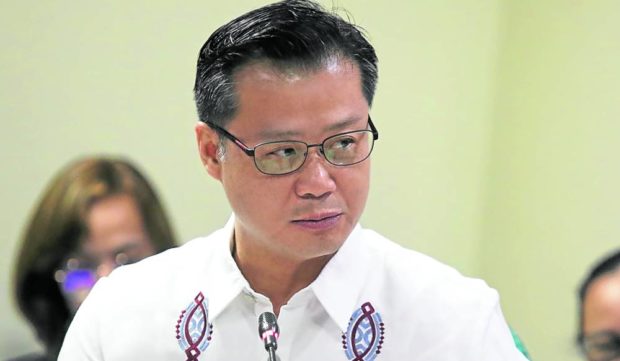Taxpayers to suffer if Maharlika fails – senators

Sen. Sherwin Gatchalian (File photo from the Senate Public Relations and Information Bureau)
MANILA, Philippines — Senators on Wednesday expressed their concerns over what they called “shaky” provisions of the bills seeking to create the Maharlika Investment Fund (MIF), arguing that Filipino taxpayers will eventually suffer in case the proposed sovereign wealth fund fails.
Sen. Sherwin Gatchalian, chair of the Senate Committee on Ways and Means, said he was wary that while the MIF bills supposedly provide safeguards against possible losses for government financial institutions, such losses would still be borne by Filipino taxpayers.
“In these types of investments, not everything is rosy. In some cases, it will have downturns. So who bears the risk? The taxpayers ultimately bear the risk. All of us will bear the risk,” Gatchalian said at the hearing of the Senate Committee on Banks, Financial Institutions and Currencies.
The Senate panel on Wednesday began hearings on the proposed MIF measures — House Bill No. 6608 and its counterpart Senate Bill No. 1670 — with members of the economic team parrying questions from senators on the soundness of the proposed venture.
Gatchalian and other senators questioned the privileges that the Maharlika Investment Corp. (MIC), which will manage the MIF, is set to enjoy supposedly in an attempt to attract investments, but give it “unfair” advantages over other private corporations.
Article continues after this advertisementUnder the proposed bills, the MIC will be exempt from national and local taxes, and from coverage of the Governance Commission for Government-owned and -controlled corporations (GCG), the Government Reform Procurement Reform law, and the salary standardization law.
Article continues after this advertisement“So in other words, (tax exemption) is a sort of an enticement for them to come in. Are we not giving undue advantage to private investors going in through this fund (because) one, they don’t pay any taxes, and two, aren’t we skewing the returns also?” Gatchalian said.
Any profit that may be derived by the MIF could be offset by the revenues lost because of the tax exemptions, the senator added.
Unfair advantage
Gatchalian noted that the scheme by which the MIF is set to “inflate” its profit by not paying taxes and in effect concealing the true cost of its capital also presents an “unfair advantage” over other mutual funds.
Sen. Francis Escudero cautioned the proponents against their plan to seek tax exemptions and other privileges for the MIF.
“[The MIC is] getting all of those benefits [of a government entity], and yet being treated as a business entity that functions as if it were a private venture,” he said.
Escudero told reporters that he also doubted the proponents’ claims of profits derived from the investments through the MIF.
“[It’s] shaky at best. They are comparing it to Indonesia, they are comparing it to Temasek which has been doing it for the longest time and has gone through a lot of challenges,” he said.
“If what we are thinking is that this MIF can derive [the same level of] profits in the next six years, I don’t think our economic managers can guarantee that type of income,” Escudero added.
He likewise raised concern over the unequal apportionment of seats in the 15-member MIC board.
“If you are putting in say, P100 billion into the MIF, and the contribution of Landbank is 50 percent, prudence and practice to protect their investment would dictate that 50 percent of the board should come from Landbank,” he said.
“In fact, you allocated representation to future private investors when they have not even put in any money. Isn’t that, to say the least, unfair?” Escudero asked.
For her part, Sen. Risa Hontiveros warned that the MIF may become the “Sovereign liability fund” as its funding will again depend on borrowings and is poised to balloon the nation’s estimated P13-trillion debt.
Private groups’ opposition
Under the proposed measures, the seed fund for the MIF will be sourced from investments of P50 billion from the Land Bank of the Philippines and P25 billion from the Development Bank of the Philippines (DBP). It is also set to get 10 percent of the gross gaming revenues of the Philippine Gaming and Amusement Corp.
Despite several changes since it was introduced in the House of Representatives last November, business groups continue to oppose the MIF bills now being deliberated in the Senate.
“As the Senate begins deliberations on the Maharlika Investment Fund (MIF), we maintain our view that such is fundamentally flawed and does not achieve the stated economic activities cited in its formation,” read the joint letter sent to the Senate by the Management Association of the Philippines, the Foundation for Economic Freedom, and the UP School of Economics Alumni Association.
“We hope the Senate will consider the MIF’s adverse impact on fiscal prudence, additionality, solvency of pension funds, contingent liabilities, independence of the Bangko Sentral ng Pilipinas (BSP), and government intervention in the economy,” they said.
While the state-managed pension funds have been removed as funding sources, they pointed out that it was now the BSP, the different government financial institutions, and the national government that are in “harm’s way.”
It explained the proposed measure will also amend the BSP’s mandate to promote monetary stability by adding an earnings factor for the MIF in its key performance indicators.
This effectively deprives the central bank of its ability to strengthen itself from its earnings to manage liquidity and inflation, as well as help distressed financial institutions, they said, warning that “it compromises the BSP’s autonomy, independence and ability to deliver on its price and financial stability mandates.”